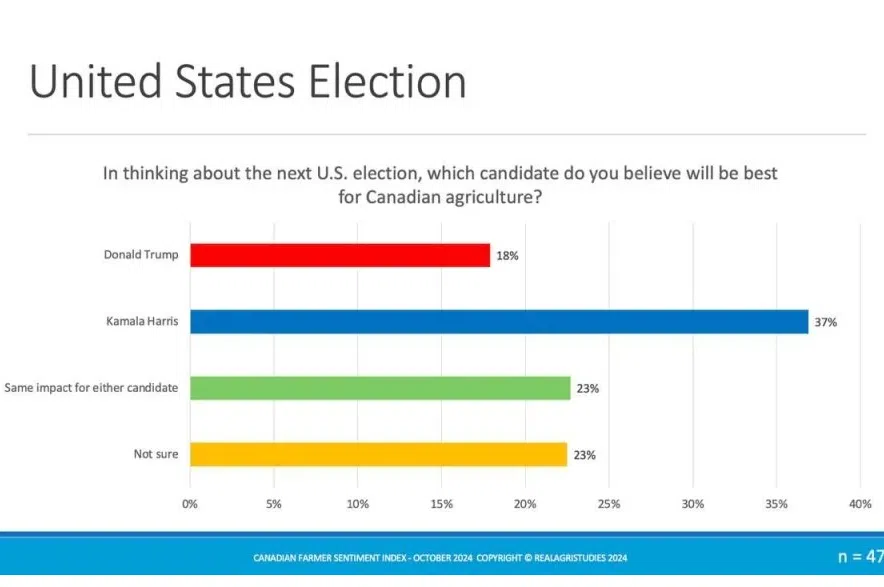Shaun Haney, founder of RealAgriculture, hosts Real Ag on the Weekends on 980 CJME and 650 CKOM. This weekend he explored what Canadian farmers and ranchers want and expect from the U.S. presidential election.
CJME and CKOM will have the results of the U.S. election live exclusively through ABC Radio on Tuesday beginning at 6pm. Listen live on CKOM here and CJME here.
Listen Shaun Haney talk about the impact of the U.S. election on Canadian farmers
RealAgriculture’s market research arm RealAgristudies surveyed Canadian farmers and ranchers about who they thought would be better for Canadian agriculture.
Of the 471 respondents surveyed in October, 37 per cent chose Kamala Harris, while 18 per cent chose Donald Trump, however 23 per cent said the outcome would be the same for Canada regardless of who won, and the same number — 23 per cent — saying they were not sure.

(RealAgristudies/submitted)
Respondents were also asked to select from a list their top three factors that led to their decisions. Top reasons for those that chose Trump in the survey were his general economic policies, his stance on energy policies that impact farming — like fuel and fertilizer — and his approach to environmental and climate policies. They were also supportive of Trump’s leadership style.
For respondents who chose Harris, leadership style was very important, as well as her support for US-Canada relations, her stance on the value of trade agreements and her position on agricultural tariffs and market access.

(RealAgristudies/submitted)
Haney also spoke to Farm Credit Canada economists Justin Shepherd and Graham Crosbie about U.S. policy issues that could affect Canadian farmers in 2025.
Mandatory country of origin labelling
Crosbie: Over the last decade at least on both sides of the aisle in Congress, there has been a slow move towards increased protectionism. There seems to be more of a focus on Made in the USA products — not just agricultural products but all types of products in general. Changes to the Product of USA labelling are effective from Jan. 1, 2026, so if producers want to put that label on pork or beef in the States, those animals have to be born, raised and slaughtered Stateside. Previously, producers could import an animal, feed and raise it and still use that label.
We’re still trying to wrap our heads around what the potential fallout is from this, in large part because we don’t know what the the appetite of the American consumer is to have that label on their plate. The ultimate determinant of of how far the labelling goes, and how much uptake there is really depends on the American consumer and their willingness to pay for those products.
One thing we are pretty sure of is that if producers are truly going to only use animals that have been born and raised in the U.S., it’s going to add costs. It’s going to disrupt supply chains between Canada and the U.S., so there will be added cost. The question really is how much is the American consumer really going to want to pay for that product of Made in the USA at a time of already elevated food prices, in particular protein prices.
Fallout from biofuel tax credit changes
Shepherd: On Jan. 1, 2025 we’re switching from a blender tax credit in the United States to a producer tax credit. This tax credit is important for ensuring profitability for biofuel producers, and specifically biodiesel and renewable diesel producers.
It means that we’re going to see some reduced competition, or the ability to compete from Canadian biofuel producers. However, it doesn’t mean that our canola oil and soybean oil can’t still flow to the United States and go into those plants that are now going to be capturing the credit. Up to this point they do a lot of tax splitting, sharing the credit. Right now, a blender that is getting that tax credit is often sharing it back with the producer and I think that’s going to continue. Future outcomes are unknown, but for right now, the Canadian oil seed producer as well as the crusher are in a good position to have the U.S. as a strong market.
The U.S. Farm Bill
Shepherd: The U.S. Farm Bill has such a big impact on Canadian agriculture because it can impact insurance prices. It can change how conservation programs are run in the United States, and ultimately, any change in U.S. acreage decisions works its way back to us in pricing.
A lot depends on the election, not only the presidency, but also who takes power in the House and in Congress. We know it will have an impact on us, but we really don’t know how yet.
This transcript has been edited for brevity and clarity.
Read more
- A look at U.S. presidential candidates’ ties to Canada ahead of this week’s election
- They sent ballots from Canada. Now, Americans prepare to watch the election from afar







